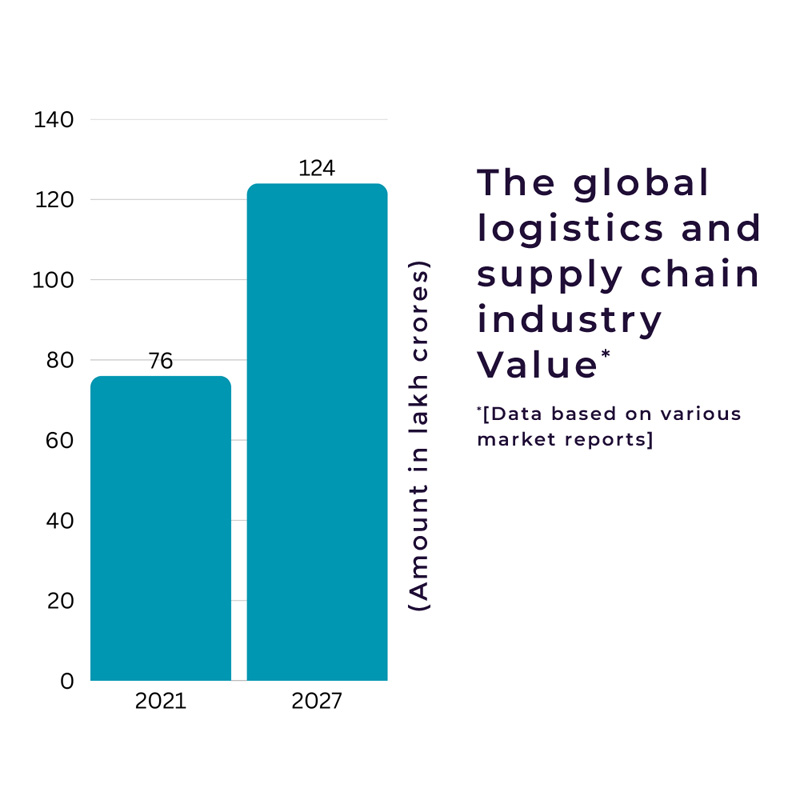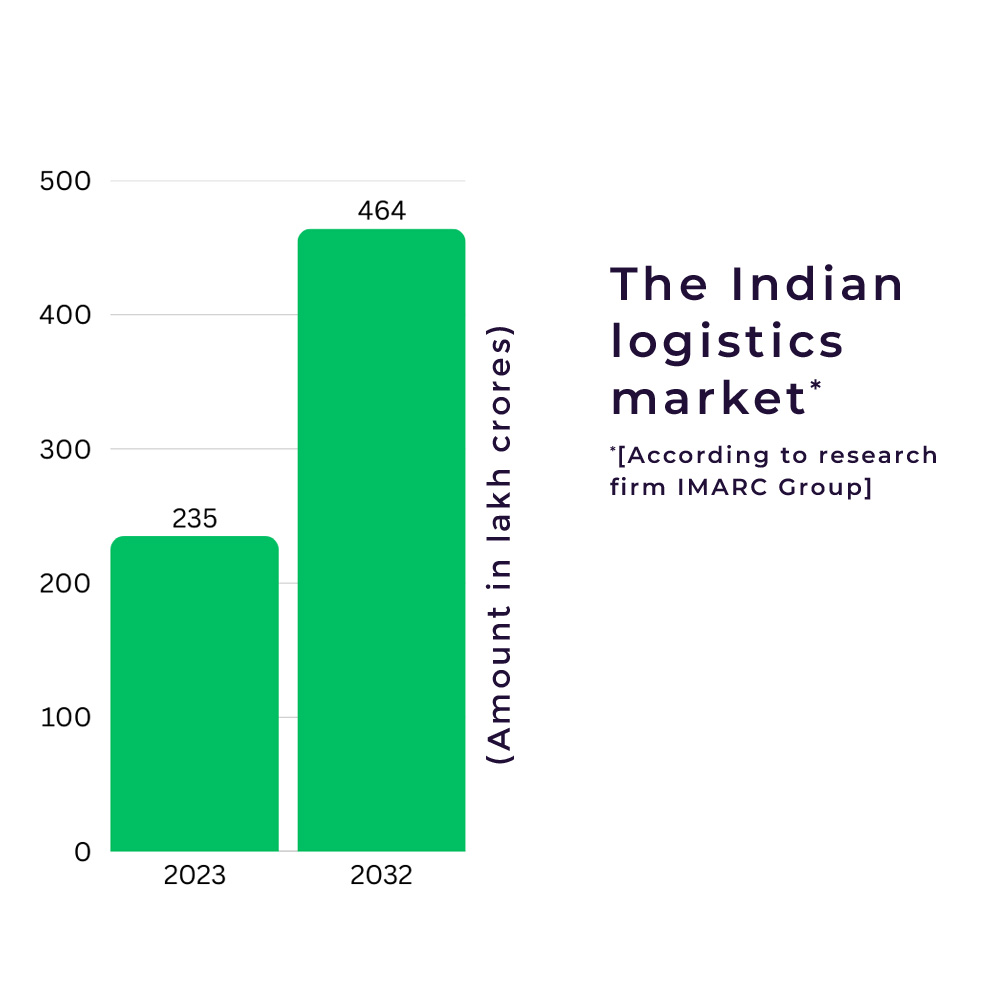
Noida: 8826913812 - 7704009510
Mumbai : 9566026613 - 9892716238
Kolkata: 7358382038 - 8428324685

The global logistics and supply chain industry was valued at over EUR 8.4 trillion (approx. INR 76 lakh crore) in 2021 and is expected to surpass EUR 13.7 trillion (INR 124 lakh crore) by 2027. This growth represents a compound annual growth rate (CAGR) of approximately 5.8 per cent over the period, according to various market reports. The Indian logistics market, on its part is growing even faster. According to research firm IMARC Group, India's logistics market reached USD 282.3 billion (approx. INR 235 lakh crores) in 2023. Projections indicate that by 2032, it is expected to reach USD 557.4 billion (approx. INR 464 lakh crores), demonstrating a CAGR of 7.85% during the period 2024-2032. These figures highlight the significant growth potential in the Indian logistics sector.


The Indian logistics and supply chain sector has experienced significant growth, driven by factors such as e-commerce expansion, increased industrial activity, and technological advancements. This growth has led to various job opportunities in different sector verticals. A noteworthy example is the industrial-real-estate boom fuelled by warehousing demand and growth in e-commerce. Companies are investing in large distribution centers, fulfilment hubs, and last-mile delivery facilities, creating a growing need for skilled professionals in logistics management, warehouse operations, and facility maintenance. Job roles in this sector include supply chain analysts, inventory managers, and logistics coordinators. Another example is the India’s automotive industry which is a significant contributor to the logistics sector. With the rise of electric vehicles, localization of production, and global supply chains, there is a high demand for automotive logistics professionals. Roles in this sector span across transportation planning, vehicle distribution, spare parts management, and supply chain optimization. Simply put, a career in logistics and supply chain offers lucrative financial and growth prospects, making it one of the most rewarding and rapidly expanding fields globally.
Programmes offer by CII School of Logistics (CII SOL)offer numerous advantages through the blending of strategic and operational skills crucial for the industry. These programmes equip students with in-depth knowledge of supply chain dynamics, including procurement, inventory management, transportation, and distribution. Graduates gain a holistic understanding of end-to-end supply chain processes, enhancing their ability to make informed decisions that optimize efficiency and cost-effectiveness. In India and globally, the biggest supply chain organizations highly value these skills, which are essential for maintaining a competitive advantage in a rapidly evolving market. CII SOL’s business management programmes provide a unique combination of features, including an industry-academia blended programme, conceptual mapping with analytics, an expert faculty system, current industry case analysis, project work guidance and assessment, internship guidance and assessment, guest lectures, industrial visits, and a professional and placement preparatory programme. They are thus designed to foster leadership and strategic thinking, enabling professionals to oversee complex logistics networks and drive innovation. This combination of technical expertise and managerial acumen positions MBA graduates as attractive candidates for leadership roles, offering opportunities for career advancement and significant contributions to their organizations' success.
Students and professionals with a minimum of 50 per cent marks in 10th, 12th and Graduate Degree courses are eligible for MBA programmes. Postgraduate students are eligible for the Ph.D. course. Check individual programme descriptions for eligibility.
The MBA programmes of the CII School of Logistics are designed to provide specialized knowledge and skills in the field of Logistics and Supply Chain Management.
Industry-integrated competency-based education with a curriculum developed and delivered by Logistics and Supply Chain Management experts.
Emerged from a partnership between the leading industry body CII (Confederation of Indian Industry) and Amity, one of India's top private universities. Offers seep industry engagements through industry visits, guest lectures, CII events, and networking platforms.Industry-integrated competency-based education with a curriculum developed and delivered by Logistics and Supply Chain Management experts.
Provides the Professional and Placement Preparatory programme that takes a 360-degree approach to prepare the students with the required skills.
Programmes are developed and delivered to seamlessly instil the required skillsets and expertise in the students and professionals to prepare them for the highly demanding Logistics and Supply Chain domains.
They familiarize the students with the benchmark metrics of Global Supply Chain Management with a clear mapping of theory, analytics, concepts and core industry-based real-world problem analysis and solutions.
They provide students with a clear pathway to integrate academic theory with industrial applications, adding value to their career options across the end-to-end supply chain, from raw material procurement to last-mile delivery of goods and services.
They impart skills for employability in the field of Supply Chain to fulfil their job description as quality professionals.
They fill in the knowledge gap in logistics by incorporating niche areas from the Shipping and Port Management sectors.
They provide adequate exposure to core supply chain functions, especially finance and costing.
The programme curricula include current trends in automation and digitalization (Industry 4.0) in transforming Smart Manufacturing, Smart Logistics, AI, Robotics, Data Analytics, Blockchain Technology, and the Internet of Things. This is to meet the technological needs from the point of production to the point of consumption, all the way to the last-mile delivery, while conforming to sustainable ESG performance metrics.